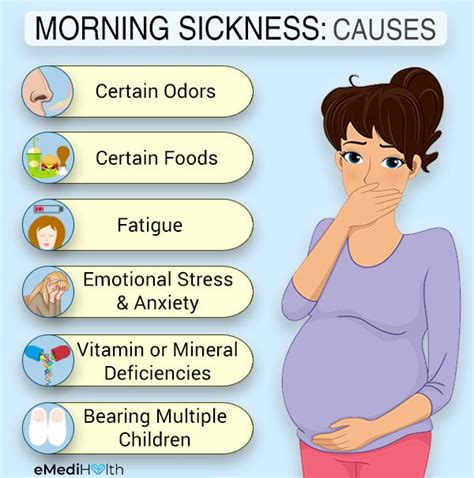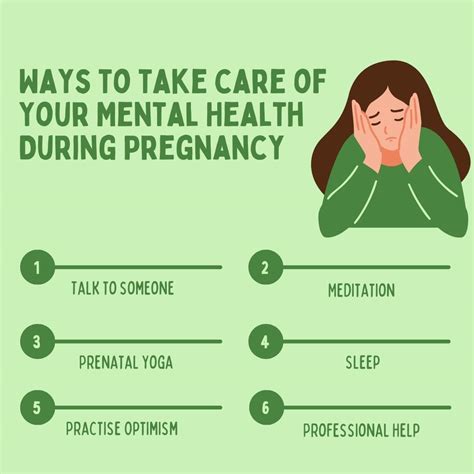Intro
Alleviate morning sickness with effective remedies. Discover natural treatments, dietary changes, and home remedies that help pregnancy nausea, including ginger, vitamin B6, and acupressure, to ease symptoms and ensure a healthy pregnancy.
Pregnancy nausea, also known as morning sickness, is a common symptom experienced by many women during the early stages of pregnancy. It is characterized by feelings of queasiness, vomiting, and dizziness, which can be triggered by various factors such as hormonal changes, food odors, and emotional stress. While it may be uncomfortable and disrupt daily life, there are several remedies and strategies that can help alleviate pregnancy nausea.
For many women, pregnancy nausea is a normal part of pregnancy, and it typically subsides by the 12th to 14th week of gestation. However, some women may experience more severe symptoms, known as hyperemesis gravidarum, which can lead to dehydration, weight loss, and other complications. It is essential to consult a healthcare provider if symptoms persist or worsen over time. In the meantime, there are various ways to manage pregnancy nausea, including dietary changes, lifestyle modifications, and natural remedies.
The causes of pregnancy nausea are not fully understood, but it is believed that hormonal fluctuations, particularly the increase in human chorionic gonadotropin (hCG), play a significant role. Other factors that may contribute to pregnancy nausea include a sensitive stomach, stress, and fatigue. Understanding the underlying causes of pregnancy nausea can help women develop effective coping strategies and find relief from their symptoms.
Understanding Pregnancy Nausea

Dietary Changes for Pregnancy Nausea
Dietary changes can play a significant role in alleviating pregnancy nausea. Eating smaller, frequent meals throughout the day can help manage symptoms, as it can reduce the likelihood of an empty stomach. Additionally, incorporating foods high in protein, complex carbohydrates, and healthy fats can help stabilize blood sugar levels and reduce nausea. Some examples of beneficial foods include: * Bananas * Rice * Applesauce * Toast * Crackers * Nuts and seeds * Lean proteins like chicken and fishNatural Remedies for Pregnancy Nausea

Lifestyle Modifications for Pregnancy Nausea
In addition to dietary changes and natural remedies, lifestyle modifications can also help manage pregnancy nausea. These include: * Getting plenty of rest: Fatigue can exacerbate pregnancy nausea, so it is essential to get adequate sleep and rest. * Staying hydrated: Drinking plenty of water and other fluids can help prevent dehydration, which can worsen pregnancy nausea. * Avoiding triggers: Identifying and avoiding triggers like strong smells, certain foods, or emotional stress can help reduce pregnancy nausea. * Practicing relaxation techniques: Stress-reducing techniques like deep breathing, meditation, and yoga can help promote relaxation and reduce pregnancy nausea.Medical Treatments for Pregnancy Nausea

Managing Pregnancy Nausea at Work
For many women, pregnancy nausea can be a challenge to manage at work. Some strategies for managing pregnancy nausea at work include: * Taking regular breaks: Taking short breaks to rest, stretch, and move around can help reduce pregnancy nausea. * Staying hydrated: Drinking plenty of water and other fluids throughout the day can help prevent dehydration and reduce pregnancy nausea. * Avoiding triggers: Identifying and avoiding triggers like strong smells or certain foods can help reduce pregnancy nausea. * Communicating with your employer: Informing your employer about your pregnancy and any necessary accommodations can help ensure a smooth and healthy work experience.Pregnancy Nausea and Mental Health

Coping with Pregnancy Nausea Emotionally
Coping with pregnancy nausea emotionally requires a combination of self-care, support, and stress-reducing techniques. Some strategies for coping with pregnancy nausea emotionally include: * Practicing self-compassion: Being kind and understanding with yourself can help reduce stress and promote emotional well-being. * Seeking support: Connecting with others who have experienced pregnancy nausea can provide emotional support and help women feel less isolated. * Engaging in stress-reducing activities: Activities like meditation, yoga, and deep breathing can help reduce stress and promote relaxation.Conclusion and Next Steps

We invite you to share your experiences and tips for managing pregnancy nausea in the comments below. If you have any questions or concerns, please do not hesitate to reach out to your healthcare provider. Additionally, if you found this article helpful, please share it with others who may be experiencing pregnancy nausea.
What are the most common symptoms of pregnancy nausea?
+The most common symptoms of pregnancy nausea include vomiting, dry heaving, and feelings of queasiness after eating or smelling certain foods.
How can I manage pregnancy nausea at work?
+Managing pregnancy nausea at work can involve taking regular breaks, staying hydrated, avoiding triggers, and communicating with your employer about your needs and any necessary accommodations.
What are some natural remedies for pregnancy nausea?
+Some natural remedies for pregnancy nausea include ginger, peppermint, acupuncture, and aromatherapy. These remedies can help reduce nausea and promote relaxation.
When should I seek medical attention for pregnancy nausea?
+You should seek medical attention for pregnancy nausea if your symptoms are severe, persistent, or worsening over time. Additionally, if you experience dehydration, weight loss, or other complications, you should consult your healthcare provider immediately.
How can I prioritize my mental health during pregnancy nausea?
+Prioritizing your mental health during pregnancy nausea involves practicing self-compassion, seeking support from others, and engaging in stress-reducing activities like meditation, yoga, and deep breathing.
